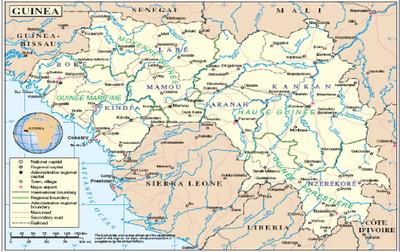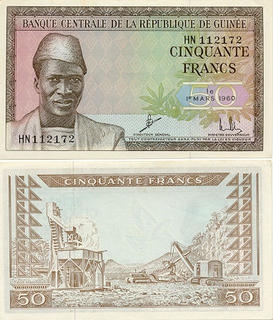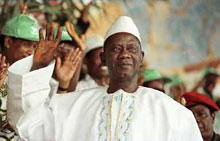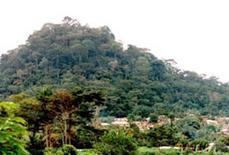(Francais et anglais intercales dans le texte)
Readers, you have been heard, and I will post more about my professional activities... but this post was already in the making, so here it is! It will also give you insights about the atmosphere and the things I may or may not have to deal with.
Lecteurs, vous avez été entendu, et j'ecrirais plus au sujet de mes activités professionnelles... mais ce post était déjà presque ecrit, donc le voila ! Il vous donnera également une idee de l'atmosphère du pays ou je travaille et de choses avec lesquelles je dois composer... ou non !

"History & Politics / Histoire & politique
The area occupied by Guinea today was included in several large West African political groupings, including the Ghana, Mali, and Songhai empires, at various times from the 10th to the 15th century, when the region came into contact with European commerce. Guinea's colonial period began with French military penetration into the area in the mid-19th century. French domination was assured by the defeat in 1898 of the armies of Almamy Samory Touré, warlord and leader of Malinke descent, which gave France control of what today is Guinea and adjacent areas.
Le secteur occupé par Guinea aujourd'hui a été inclus dans plusieurs grands groupements politiques africains occidentaux, y compris les empires du Ghana, du Mali, et du songhai, à de diverses heures de la 10ème au 15ème siècle, quand la région a entré en contact avec le commerce européen. La période coloniale de la Guinée a commencé par la pénétration militaire française dans le secteur en siècle de mid-19th. La domination française a été assurée par la défaite dans 1898 des armées d'Almamy Samory Touré, seigneur de la guerre et chef de descente de Malinke, qui a donné la commande de la France de ce qui est aujourd'hui Guinée et secteurs adjacents.
France negotiated Guinea's present boundaries in the late 19th and early 20th centuries with the British for Sierra Leone, the Portuguese for their Guinea colony (now Guinea-Bissau), and the Liberia. Under the French, the country formed the Territory of Guinea within French West Africa, administered by a governor general resident in Dakar. Lieutenant governors administered the individual colonies, including Guinea.
Les frontières actuelles de la Guinée négociée par la France vers la fin de la 19ème et les début du 20ème siècles avec les Anglais sont la Sierra Leone, les Portugais pour leur colonie de Guinée (maintenant Guinée-Bissau), et le Libéria. Sous les Français, le pays a formé le territoire de la Guinée dans l'Afrique occidentale française, administré par un résidant général de gouverneur à Dakar. Les gouverneurs de lieutenant ont administré les différentes colonies, y compris la Guinée.
 Led by Ahmed Sékou Touré, head of the Democratic Party of Guinea (PDG), which won 56 of 60 seats in 1957 territorial elections, the people of Guinea in a September 1958 plebiscite overwhelmingly rejected membership in the proposed French Community. The French withdrew quickly, and on October 2, 1958, Guinea proclaimed itself a sovereign and independent republic, with Sékou Touré as president.
Led by Ahmed Sékou Touré, head of the Democratic Party of Guinea (PDG), which won 56 of 60 seats in 1957 territorial elections, the people of Guinea in a September 1958 plebiscite overwhelmingly rejected membership in the proposed French Community. The French withdrew quickly, and on October 2, 1958, Guinea proclaimed itself a sovereign and independent republic, with Sékou Touré as president.
Mené par Ahmed Sékou Touré, tête du parti démocratique de la Guinée (PDG), qui a gagné 56 de 60 sièges dans 1957 élections territoriales, les personnes de la Guinée dans un plébiscite de septembre 1958 ont primordialement rejeté l'adhésion dans la Communauté française proposée. Français s'est retiré rapidement, et sur octobre 2, 1958, la Guinée s'est proclamée une république souveraine et indépendante, avec Sékou Touré comme président.

Under Touré, Guinea became a one-party state, with a closed, socialized economy and no tolerance for human rights, free expression, or political opposition, which was ruthlessly suppressed. The regime's repression drove more than a million Guineans into exile, and Touré's paranoia ruined relations with foreign nations, including neighboring African states, increasing Guinea's isolation and further devastating its economy. Sékou Touré and the PDG remained in power until his death on April 3, 1984, when a military junta headed by then-Lt. Col. Lansana Conte seized power.
Sous Touré, la Guinée est devenue un état unipartite, avec une économie fermée socialiste et aucune tolérance pour des droits de l'homme, la libre expression, ou l'opposition politique, qui etaient été impitoyablement supprimés. La répression du régime a conduit plus d'un million de Guinéens dans l'exil, et la paranoïa de Touré a ruiné des relations avec des nations étrangères, y compris les Etats africains voisins, augmentant l'isolement de la Guinée et dévastant son économie. Sékou Touré et le PDG est resté au pouvoir jusqu'à sa mort le 3 avril 1984, quand une elite militaire dirigee par l'alors-Lieutenant. Colonnel Lansana Conte a pris le pouvoir.
The Military Committee of National Recovery (CMRN) took control of Guinea in April 1984, just one week after the death of independent Guinea's first president, Sékou Touré. The CMRN announced its intention to liberalize the economy, promote private enterprise, and encourage foreign investment in order to develop the country’s rich natural resources. The CMRN formed a transitional parliament which created a new Constitution (La Loi Fundamental) and Supreme Court in 1990. The country’s first multi-party presidential election took place in 1993. These elections were reportedly marred by irregularities and lack of transparency on the part of the government. Legislative and municipal elections were held in 1995. Conte’s ruling PUP party won 76 of 114 seats in the National Assembly, amid opposition claims of irregularities and government tampering. The new National Assembly held its first session in October 1995.
Le Comité militaire du rétablissement national (CMRN) a pris les commandes de la Guinée en avril 1984, juste une semaine après la mort du premier président de la Guinée indépendante, Sékou Touré. Le CMRN a annoncé son intention de libéraliser l'économie, de favoriser l'entreprise privée, et d'encourager l'investissement étranger afin de développer les ressources naturelles riches du pays. Le CMRN a formé un parlement transitoire qui a créé une nouvelle constitution (principe fondamental de Loi de La) et la cour suprême en 1990. La première élection présidentielle multi-partis du pays a eu lieu en 1993. Ces élections ont été censément troublées par des irrégularités et manque de transparent de la part du gouvernement. Des élections législatives et municipales ont été tenues en 1995. La partie régnante du PUP de Conte a gagné 76 de 114 sièges dans l'Assemblée nationale, parmi des réclamations d'opposition des irrégularités et du gouvernement trifouillant. La nouvelle Assemblée nationale a tenu sa première session en octobre 1995.
Several thousand malcontent troops mutinied in Conakry in February 1996, destroying the presidential offices and killing several dozen civilians. Mid-level officers attempted, unsuccessfully, to turn the rebellion into a coup d’etat. The Government of Guinea made hundreds of arrests in connection to the mutiny, and put 98 soldiers and civilians on trial in 1998.
Plusieurs milliers de troupes mécontentes se sont révoltées à Conakry en février 1996, détruisant les bureaux présidentiels et tuant plusieurs douzaines de civils. Les officiers intermediaires ont essayé, sans succès, de transformer la rébellion en coup d'état. Le gouvernement guineen a fait des centaines d'arrestations liees à la révolte, et 98 soldats et civils furent traduits en justice en 1998.
In December 1998, Conté was re-elected to another 5-year term. Following his reelection and the improvement of economic conditions through 1999, Conté reversed direction, making wholesale and regressive changes to his cabinet, which have led to increased cronyism, corruption, and a retrenchment on economic and political reforms.
En décembre 1998, Conté a été réélu pour un autre mandat de cinq ans. Après sa réélection et l'amélioration des conditions économiques par 1999, Conté a renversé la direction, faisant en gros et les changements régressifs dans son coffret, qui ont mené a une augmentation du cronyism, à la corruption, et à un retranchement sur des réformes économiques et politiques.
Beginning in September of 2000, the Revolutionary United Front (RUF) rebel army, backed by Liberian President, Charles Taylor, commenced large-scale attacks into Guinea from Sierra Leone and Liberia. The RUF, known for their brutal tactics, in the near decade-long civil war in Sierra Leone, operated with financial and material support from the Liberian government and its allies. These attacks destroyed the town of Gueckedou as well as a number of villages, causing large-scale damage and the displacement of tens of thousands of Guineans from their homes. The attacks also forced the UNHCR to relocate many of the 200,000 Sierra Leonean and Liberian refugees residing in Guinea.
Commençant en septembre de 2000, le Revolutionary United Front (RUF), soutenu par le Président liberien , Charles Taylor, a commence, du Sierra Leone et du Libéria, des attaques de grande échelle en Guinée. Le RUF, connu pour leur tactique brutale, dans la guerre civile de dix ans en Sierra Leone, actionnée avec l'appui financier et matériel à partir du gouvernement libérien et de ses alliés. Ces attaques ont détruit la ville de Gueckedou aussi bien qu'un certain nombre de villages, entraînant des dommages à grande échelle et le déplacement des dizaines de milliers de Guinéens de leurs maisons. Les attaques ont également forcé l'UNHCR a replacer plusieurs des 200.000 Sierra-Léonais et de réfugiés libériens résidant en Guinée.
After the initial attacks in September 2000, President Conté accused Liberian and Sierra Leonean refugees living in the country of fomenting war against the government. Soldiers, police, and civilian militia groups rounded up thousands of refugees. Approximately, 3,000 refugees were detained, although most were released by year’s end.
Après les attaques initiales en septembre 2000, le Président Conté a accuse les réfugiés Libériens et Sierra-Léonais vivant dans le pays de la guerre de conspiration contre le gouvernement. Les soldats, la police, et les groupes civils de milice ont traque des milliers de réfugiés. Approximativement, 3.000 réfugiés ont été détenus, bien que les la plupart aient été libérées a la fin de l'annee.
In December 2003 Conte was re-elected for a third term, after having had the presidential mandate extended two years earlier. In early 2004 a newly appointed prime minister resigned while out of the country in Paris. Thereafter, followed a reshuffling of the cabinet.
En décembre 2003, Conte a été réélu pour un troisième mandat, après que son mandat présidentiel ait ete prolongé deux ans plus tôt. Au début de 2004 un premier ministre nouvellement désigné a démissionné tandis que hors du pays à Paris. S'en est suivi un remaniement du cabinet.
Economy / Economie 
Richly endowed with minerals, Guinea possesses an estimated one-third of the world's proven reserves of bauxite, more than 1.8 billion metric tons (MT) of high-grade iron ore, significant diamond and gold deposits, and undetermined quantities of uranium. Guinea has considerable potential for growth in the agricultural and fishing sectors. Soil, water, and climatic conditions provide opportunities for large-scale irrigated farming and agro-industry. Possibilities for investment and commercial activities exist in all these areas, but Guinea’s poorly developed infrastructure and rampant corruption continue to present obstacles to large-scale investment projects.
Richement dotée de minerais, la Guinée possède un un tiers environ des réserves mondiales de bauxite, plus de 1.8 milliard de tonnes métriques (TM) de minerai de fer de haute qualite, des dépôts significatifs de diamant et d'or, et des quantités indéterminées d'uranium. La Guinée a un potentiel considérable pour la croissance des secteurs agricoles et de pêche. Le sol, l'eau, et les conditions climatiques présentent des opportunites d'affermage et d'agro-industrie irriguée à grande échelle. Les possibilités pour l'investissement et les activités commerciales existent dans tous ces secteurs, mais l'infrastructure mal développée et la corruption effrénée de la Guinée continuent à présenter des obstacles aux projets d'investissement à grande échelle.
On a day-to-day level the economic situation of most Guineans is very poor. Inflation is high and prices of key goods, particularly rice and fuel, have risen dramatically in 2004. Such price increases led to riots in major towns and a growing feeling of unease and dissatisfaction.
Concretement, la situation économique de la plupart des Guinéens est très pauvre. L'inflation est haute et les prix des marchandises principales, en particulier du riz et du carburant, ont monté nettement en 2004. De telles augmentations des prix ont mené aux émeutes dans les villes principales et à un sentiment croissant de malaise et de mécontentement."
(Source : HOC Visitors Guide)
The Beaver
My guest map is wonderful ! And you'd all be wonderful to post, all of you lurk mode readers!
Thanks and may the winds of Fate blow your way !

4 comments:
What an interesting read. Being a History Major in college I of course enjoy.
Thanks
Your answer to the question "What is the sum total of 6478 and 36273?" should be "What ever the government wants it to be." It is hard to imagine wealth and poverty so close together in one beautiful place. I am not brave when traveling. I have been actually chased out of Mexico (my fault) and can't get it out of my mind that laws are easy to break without even knowing it. I hope some day a fuller account can be had by your loyal fans. Please stay safe. If my fears are exaggurated and you are free to post as you please, send some pictures of the food you eat there. What do the locals eat? You mentioned rice, I trust it's not basmotie rice. Does your hair style matter in Guinea? I for some reason look much better when dirty. Does it do anything special for you? Do you wear field clothes or business attire? Oh well. I hope you don't mind the interest, but your life is an adventure to read about and it is definitely fun from this side. Thanks Oh Great One. Keep up the good work. Save the world if you can, but no sacrificial stuff.
If it continue like this, I will have to take a day off to read all your posting ;o)
It's always a pleasure to have your little story to read...
(en plus je serais mal placé pour donné des leçons sur la longueur des msg ;-))
xx
I can't get over the fact that you are transcribing each and every one of your posts from one language to the other--that's so much work. You are crazy. But that's nothing new :)
Post a Comment